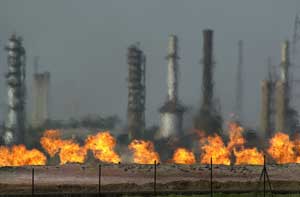Renewable Energy and Global Stability
 An Agence France-Presse article, reprinted at Terradaily.com, got me thinking about some of the unanticipated results of a radical shift to renewable energy systems.
An Agence France-Presse article, reprinted at Terradaily.com, got me thinking about some of the unanticipated results of a radical shift to renewable energy systems.
In "OPEC Casts A Dark Eye On The Greening Of Energy," writer Peter Capella quotes sources from within OPEC and Saudi Arabia on the increasing emphasis on green energy in the EU, US and globally. Their reactions aren't terribly surprising -- ranging from wholesale denial:
Yet, oil remains "the leading fuel in the global energy mix for the foreseeable future," said OPEC acting Secretary General Mohammed Barkindo.
...to defensiveness:
Oil producers are also concerned about new anti-pollution regulations that not only aim to drive down consumption, but also oblige oil companies to supply more costly, highly-refined "cleaner" fuels."Some government policies which artificially curtail demand, and create demand uncertainties irrespective of market signals, will have economic ramifications that could jeopardise (the) global energy future," [Saudi Oil Minister Ali al-]Nuami complained.
...with an overall sense of injury and insult than anyone would dare consider moving rapidly away from petroleum.
It's easy to respond to this with more than a little schadenfreude, an ever-increasing delight at their dismay. Few people in the West are happy with the behavior of oil exporting nations, so sticking a thumb in their eye has a certain base appeal. As folks like Tom Friedman have made a career of late out of calling for a shift to renewables primarily as a way of de-funding unpalatable regimes, such a response is entirely predictable.
For reasons that have more to do with environmental stability than global amity, I feel even more assertive than they about the need to get off of petroleum (just in case there was any question).
But the reaction from OPEC and Saudi Arabia to comparatively mild greenish policies (such as -- hold onto your hats -- replacing 20% of oil consumption with renewables, nuclear and "clean fossil fuels" by 2020) strikes me as a huge early indicator of the next phase of global instability coming from the Middle East, Venezuela and Nigeria.
It is possible that we see well over a 20% reduction in oil consumption by 2020 due to a combination of alternative energy production, carbon taxes, political considerations, oil peaking and (of course) greater use efficiency. 50% seems outrageously high, but I'm not willing to say that's impossible; the situation we're in now, with the overlap of climate crisis, energy security concerns, and markets looking for new sources of innovation seems ripe for a "tipping point" transition. With a big chunk of oil revenues gone, the nations with economies built entirely upon petroleum exports would find themselves in serious economic and political straits.
This is not hard to predict; in fact, it's almost a certainty (few of the major oil exporting countries have demonstrated a real aptitude for managing rapid change). The OPEC ministers would see this as readily as we do. This is a tremendous threat to their well-being. Some of the oil exporting nations will become more accommodationist in order to secure support from richer countries (although it strikes me as likely they'll turn to China before they turn to the US or Europe). But some will spiral apart, using the increasingly-common tools of global disruption to weaken neighbors and trip up the West.
What are the odds that we'll see a significant system disruption "terrorist" attack against a factory producing solar cells, a major wind farm, or some other visible and symbolic part of the emerging renewable energy infrastructure in the next ten years? These are not facilities that would currently be considered high-priority (or high-security). I haven't seen anyone talking about the possibility of global guerilla strikes against non-petroleum energy facilities as part of the spasm of collapse in the OPEC world -- if any of you have, please send me pointers.
I think this is going to be fairly big. How readily could these nations deal with the loss of a big chunk of their income in a comparatively short time? If I were in charge of the transition away from fossil fuels, I'd have some contingency plans in store just in case decline become collapse far faster than expected.
In no way does this make me think we need to slow the move to non-fossil fuels. We should, however, pay very close attention to the unexpected changes such a move could unleash.






Comments
I'd think the attacks would be more financial than violent. Blowing up a solar chip plant or some windmills isn't going to do much. Buying up and burying patents and technology is another thing altogether (and may very well be an established procedure). Defunding and making life difficult for start-ups is another avenue for mischief. Follow the money or lack of it.
BTW, I published my notes on a lecture by Solitaire Townsend of Futerra on "climate change communications" at MIT a week or so ago. It's one of my diaries at dailykos
http://www.dailykos.com/story/2006/9/13/05049/4227
Posted by: gmoke | September 18, 2006 5:37 PM
The possibilities for political leverage should be considered as well.
There is little doubt that the current US administration is very 'pro-oil' (more so than the dems). As everyone has been painfully aware, oil prices have been very high of late. Yet, with mid-term elections approaching, there is a respite: prices are the lowest in five months, and look to reduce further.
Coincidence? Let's see what happens in November.
Posted by: Tony Fisk | September 18, 2006 7:00 PM
The movie Syriana (a "message" movie) depicts the US keeping oil-producing nations deliberately unstable.
Posted by: Chris Phoenix | September 19, 2006 3:47 AM